Corporal punishment is still a thing in Tennessee? Time to end it for our kids' sake
In 1977, the U.S. Supreme Court ruled that corporal punishment against school children does not violate the federal Constitution.
Justices ruled 5-4 in the Ingraham v. Wright decision that constitutional protections against cruel and unusual punishment (8th Amendment) and for due process against loss of life, liberty or property (14th Amendment) apply only to convicted criminals when it comes to physically disciplining a citizen.
They relied on historical precedent and wrote that common law provided safeguards against abuse or excessive punishment.
Forty-six years later, two Tennessee public school educators stand accused of assault for allegedly paddling a student in school and harming the child.
It’s a reminder that corporal punishment is still legal in Tennessee, but it shouldn’t be.
This case against the educators should persuade lawmakers to ban it completely when the Tennessee General Assembly’s 2024 legislative session starts in January.
Corporal punishment might pass constitutional muster, but it’s wrong and harmful for children.
Tennessee makes an exception on punishing schoolchildren
Twenty-three states do not allow or outright prohibit corporal punishment in schools.

According to the U.S. Department of Education, Tennessee, however, is among the 16 that do allow it although the Volunteer State is among five that ban the punishment for children with disabilities.
Several school districts in Tennessee prohibit the practice. Jackson County, Tennessee, about 90 miles northeast of Nashville, does not.
On Nov. 7, Dodson Branch Elementary School teacher Jackson Patterson and Assistant Principal Tena Lynn, both of Jackson County, were arrested on charges of simple assault and criminal responsibility of assault, respectively.
The Tennessee Bureau of Investigation, Jackson County Sheriff’s Office and the Tennessee Department of Children’s Services assert the student complained of pain after being examined medically, according to a TBI press release.
There are some details that remain unclear. For example, even though the school has a process for administering corporal punishment, did the educators violate it somehow? Was the child protected against the alleged paddling because of a disability?
According to The Tennessean’s story: “A TBI spokesperson declined to release any further details about the incident, citing the open case.”
School School Principal Brian Lee told reporters he could not comment on the case or investigation.
Both White House and World Health Organization urge an end to corporal punishment
U.S. Secretary of Education Miguel A. Cardona wrote a letter to governors and state and local school leaders urging them to end the use of corporal punishment.
“The practice of corporal punishment is antithetical to positive child and adolescent development and school safety,” Cardona wrote.
This is not just a Biden administration position. The World Health Organization warns against it too.
“Evidence shows corporal punishment increases children’s behavioural (sic) problems over time and has no positive outcomes,” according to a World Health Organization fact sheet from Nov. 23, 2021.
In 2012, the Canadian Medical Association Journal published an article documenting lessons from 20 years of research on corporal punishment.
“As recently as 20 years ago, the physical punishment of children was generally accepted worldwide and was considered an appropriate method of eliciting behavioural (sic) compliance that was conceptually distinct from physical abuse,” the authors wrote. “However, this perspective began to change as studies found links between ‘normative’ physical punishment and child aggression, delinquency and spousal assault in later life.”
In short, children who receive corporal punishment are physically, emotionally and mentally harmed, which has implications for their mental health and development.
Why the Supreme Court dissenters challenged the majority
The four-justice dissent in the Supreme Court’s Ingraham ruling took great issue with the majority for ignoring precedent in past cases and for putting words in the Founding Fathers’ mouths.

“… the constitutional prohibition is against cruel and unusual punishments; nowhere is that prohibition limited or modified by the language of the Constitution,” wrote Justice Byron White.
“Certainly, the fact that the Framers did not choose to insert the word ‘criminal’ into the language of the Eighth Amendment is strong evidence that the Amendment was designed to prohibit all inhumane or barbaric punishments, no matter what the nature of the offense for which the punishment is imposed.”
The dissenters – White joined by Justices William Brennan, Thurgood Marshall and John Paul Stevens – were ahead of their time.
Corporal punishment might have been deemed acceptable in the 1970s, but it should no longer be allowed in the 21st century.
David Plazas is the director of opinion and engagement for the USA TODAY Network Tennessee. He is an editorial board member of The Tennessean. He hosts the Tennessee Voices videocast and curates the Tennessee Voices and Latino Tennessee Voices newsletters.. Call him at (615) 259-8063, email him at dplazas@tennessean.com or tweet to him at @davidplazas.
This article originally appeared on Nashville Tennessean: TN educators spanked a child. We must make corporal punishment illegal

